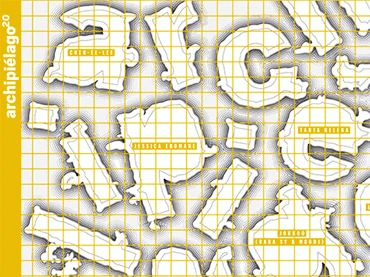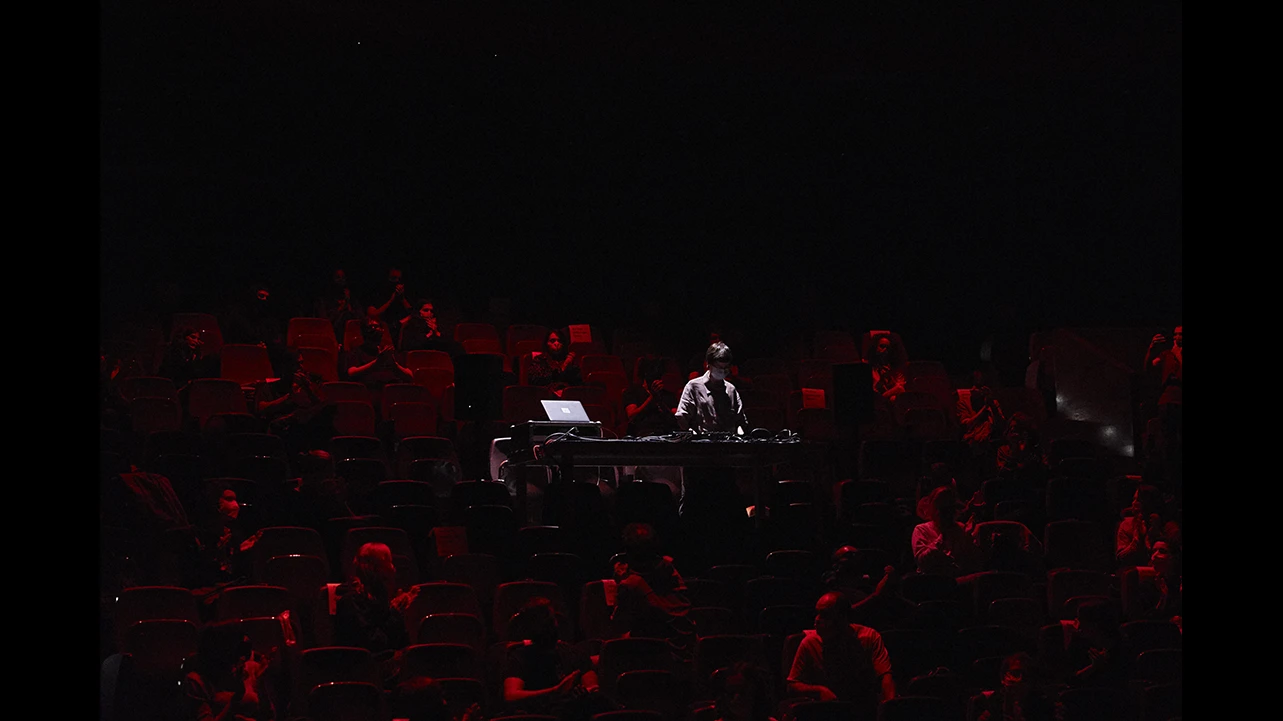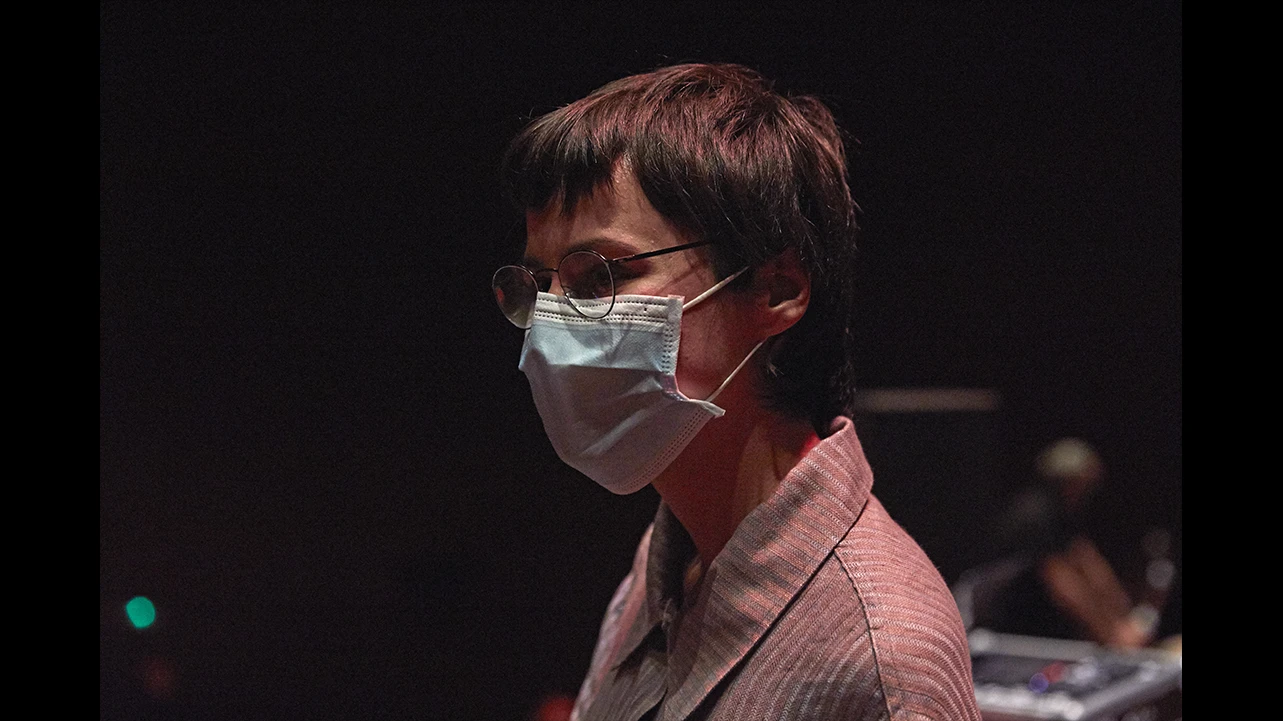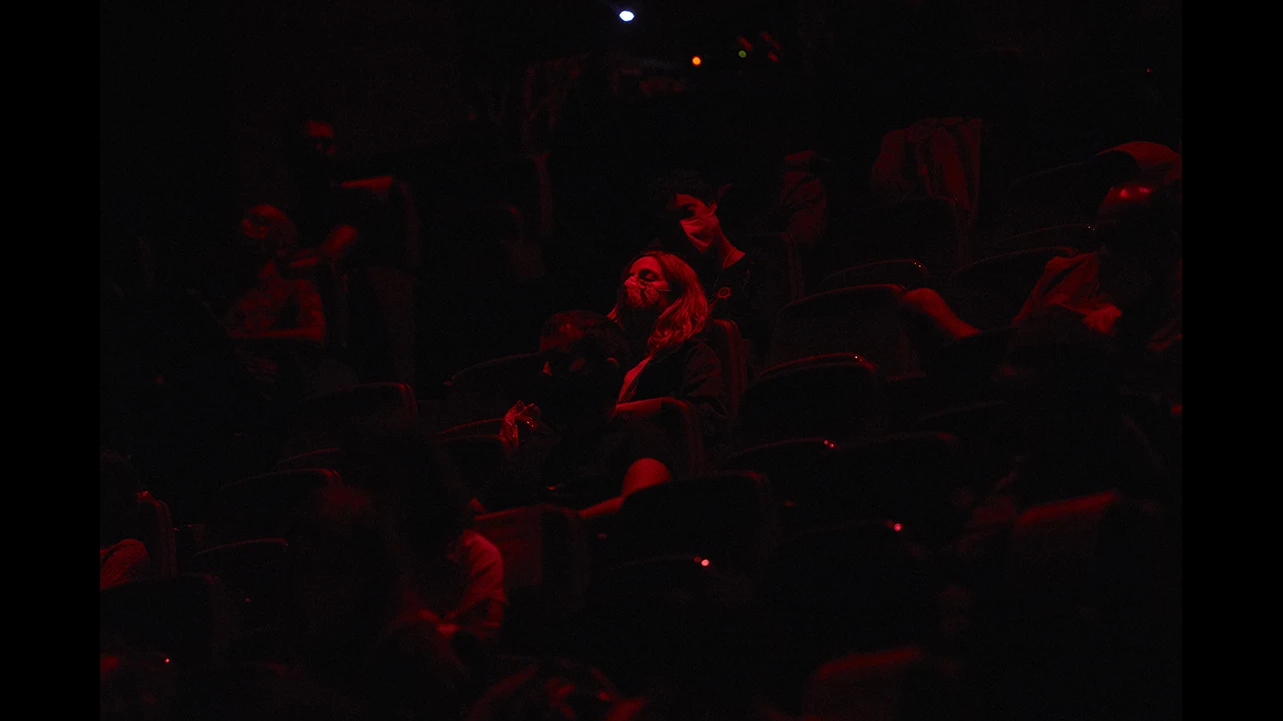
Archipielago 2020
Held on 18 Sep 2020
For a fourth consecutive year, the concert series Archipelago invites the audience to delve into the complex nature of the contemporary world through listening and explores the relationship between experimental music and popular culture by way of sounds from different narratives and geographies. The present edition continues to conduct research into that popular repertory as a form transmitting knowledge, questioning the globalising principles associated with notions such as experimentation and avant-garde.
Mix, transmission and mutation are terms which, musically, can have a positive meaning, and are aspects this concert series has always embraced. Yet today these words have become imbued with a negative connotation, reflecting the shift towards the hermeticism of nation states and their borders: How will contemporary music genres be affected? What about the different sound communities scattered around the world? To what degree will it impact the practices of an entire generation of musicians? And the live music experience? How will local aspects be re-signified in this new setting? How will networks be re-built in a world where the freedom of movement and contact of bodies are limited?
In dealing with these enquiries, the latest edition of Archipelago assumes a novel format: all acts will take place outdoors in the Sabatini Building Garden via a quadrophonic arrangement of sound, placing the stress on the physicality of sound and offering DJ-led listening sessions, whilst drawing inspiration from the experience of diaspora. Concerts which look to reinvent popular culture and speculate on what is in store and on constructing in a particularly unpredictable future.
Programme
Friday, 18 September – from 7pm to 9pm
Doors open at 6:30pm
7pm - Cher-ee-lee
Cher-ee-lee is the moniker Jerilyn Gonçalves uses for her sessions and podcasts, some of which have featured on digital platforms such as Radio Relativa and KRAAK. Of note is her radio show Música para Camaleones (Music for Chameleons), in which she traces the plurality of directions taken by Venezuela’s sound heritage, within and beyond its borders, with the project leading Gonçalves to study her country’s music with the aim of, as she puts it, “building a home away from home”. Cher-ee-lee is a native from Caracas who had to move to Madrid, integrating into the community of Venezuelan expatriates settled in Spain, the largest in Europe. For Archipelago she leads a session around the captivating musical syncretism of Venezuela and its subsequent influence on manifestations of contemporary experimentation. In short, an invitation to discover an uncommon narrative on Venezuela’s fertile culture and history.
8pm - Jessica Ekomane
Rhythm, tone, time and space are probably the four variables that define the compositions of this French artist, residing in Berlin, who is a great admirer of Györgi Ligeti and Maryanne Amacher. In Archipelago, she performs a concert which, through the use of a quadrophonic system and the immersive nature of her sonic landscapes, seeks to trigger a cathartic effect among the audience as she employs her experience of making installations in which psychoacoustics are at the core. Ekomane’s pieces, moreover, depart from an investigation into the relationships between individual perception and collective dynamics, between listening and its social determinants. Multivocal (2019), her debut album, aptly demonstrates her rigorous aesthetics and working methodology — seemingly static, but ever-changing, to the point of inducing a kind of trance in the listener.
Saturday, 19 September – from 1pm to 2pm
Doors open at 12:30pm
1pm - Lucrecia Dalt
In recent years, this Berlin-based Colombian artist has developed a prolific career at the intersection of electroacoustic music, vocal experimentation and installation. Dalt’s work perpetually draws from myriad musical, literary and artistic references, moving between territories as far-reaching as science fiction, geology and animism. In this vein, it is worth highlighting the installation made in 2019, with Maria Thereza Alves, in the German capital’s botanical garden during the CTM festival, in which both gave a voice to tropical plants renamed under Western classifications. Her appearance at the festival also served to present No Era Sólida (2020) in a quadrophonic format, a record which delves into the strands already opened in Anticlines (2018). This latest work unfolds through Lia, a kind of projection of the artist that materialises vocally in an act which draws parallels with Interface, a poem by Chicana poet Gloria Anzaldúa in which she narrates her affaire with an extraterrestrial being; a queer and mestizo text, from which the title of the album originates.
Saturday, 19 September – from 6pm to 9pm
Doors open at 5:30pm
6pm - Jokkoo (Baba Sy & Mbodj)
The Jokkoo collective came into being in Barcelona in 2017 to disseminate music and sound narratives from the African continent and its diasporas. Despite a markedly electronic identity, their sounds did not find a place on the dance floors of the Catalan city. Thus, Baba Sy and Mbodj (Maguette Dieng) — joined by Opoku, Mookie and B4mba over the past year — decided to bring this musical ebullience to the fore at parties, events and a programme on the radio station Dublab, with reference points most notably including genres which, with a cosmic and futurist spirit, seek to transform the analysis of the past and foreground the present. This guided listening session focuses on the inheritance and echoes of the black Atlantic, a sound journey that is also an account of certain histories that closely run through this duo.
7pm - Tarta Relena
Tarta Relena is a Catalan duo, made up of Marta Torrella (contralto) and Helena Ros (soprano), that explores, a cappella, the sonorities of different oral tradition music and singer-songwriters related to the Mediterranean. Both came into contact with polyphony via choral music, leading them to explore renaissance and baroque repertoires, in addition to their background in musicology (Marta) and linguistics (Helena), which goes some way towards explaining their performances of ancient Sephardic, Greek, Corsican and Menorcan songs. Whilst respecting tradition, their aim is not to perpetuate it and both are quick to avoid any glimmer of purism — thus, they accept with humour the tag “progressive Gregorian” in defining their music. For Archipelago they put forward a concert that reflects the achievements of their outstanding debut, Ora pro nobis (2019), and more recently Intercede pro nobis (2020), a work which welcomes the introduction of subtle electronic arrangements.
8pm - Lucrecia Dalt
In recent years, this Berlin-based Colombian artist has developed a prolific career at the intersection of electroacoustic music, vocal experimentation and installation. Dalt’s work perpetually draws from myriad musical, literary and artistic references, moving between territories as far-reaching as science fiction, geology and animism. In this vein, it is worth highlighting the installation made in 2019, with Maria Thereza Alves, in the German capital’s botanical garden during the CTM festival, in which both gave a voice to tropical plants renamed under Western classifications. Her appearance at the festival also served to present No Era Sólida (2020) in a quadrophonic format, a record which delves into the strands already opened in Anticlines (2018). This latest work unfolds through Lia, a kind of projection of the artist that materialises vocally in an act which draws parallels with Interface, a poem by Chicana poet Gloria Anzaldúa in which she narrates her affaire with an extraterrestrial being; a queer and mestizo text, from which the title of the album originates.
With the sponsorship of:
Curators:
Rubén Coll and José Luis Espejo
Collaboration:
Organised by
Museo Reina Sofía
Sponsorship:







Más actividades

Difficulty. Forms and Political Effects of Deviation in Writing and Contemporary Art
23 February – 14 December 2026 – Check programme
Difficulty. Forms and Political Effects of Deviation in Writing and Contemporary Art is a study group aligned towards thinking about how certain contemporary artistic and cultural practices resist the referentiality that dominates the logics of production and the consumption of present-day art. At the centre of this proposal are the concepts of difficulty and deviation, under which it brings together any procedure capable of preventing artistic forms from being absorbed by a meaning that appears previous to and independent from its expression. By ensuring the perceptibility of their languages, difficulty invites us to think of meaning as the effect of a signifying tension; that is, as a productive and creative activity which, from the materiality of art objects, frees aesthetic experience from the representational mandate and those who participate in it from the passiveness associated with tasks of mimesis and decoding.
The economy of the referential norm translates the social logic of capitalism, where insidious forms of capturing subjectivity and meaning operate. In the early 1980s, and adopting a Marxist framework, poet Ron Silliman highlighted how this logic entailed separating language from any mark, gesture, script, form or syntax that might link it to the conditions of its production, rendering it fetichised (as if without a subject) and alienating its users in a use for which they are not responsible. This double dispossession encodes the political strategy of referential objectivity: with no subject and no trace of its own consistency, language is merely an object, that reality in which it disappears.
The political uses of referentiality, more sophisticated today than ever before, sustain the neoliberal-extractivist phase of capitalism that crosses through present-day societies politically, economically and aesthetically. Against them, fugitive artistic practices emerge which, drawing from Black and Queer studies and other subaltern critical positions, reject the objective limits of what exists, invent forms to name what lies outside what has already been named, and return to subjects the capacity to participate in processes of emission and interpretation.
Read from the standpoint of artistic work, the objective capture of referentiality may be called transparency. Viewed from a social contract that reproduces inequality in fixed identity positions, transparent in this objectivity are, precisely, the discourses that maintain the status quo of domination. Opposite the inferno of these discourses, this group aims to collectively explore, through deviant or fugitive works, the paradise of language that Monique Wittig encountered in the estranged practices of literature. For the political potency of difficulty — that is, its contribution to the utopia of a free language among equals — depends on making visible, first, its own deviations; from there, the norm that those deviations transgress; and finally, the narrowness of a norm which in no way exhausts the possibilities ofsaying, signifying, referring and producing a world.
From this denouncement of referential alienation, fetishisation and capture, Difficulty. Forms and Political Effects of Deviation in Writing and Contemporary Art turns its attention to the strategies of resistance deployed by contemporary artists and poets. Its interest is directed towards proposals as evidently difficult or evasive as those of Gertrude Stein, Lyn Hejinian, Theresa Hak Kyung Cha, Kameelah Janan Rasheed, Kathy Acker, María Salgado and Ricardo Carreira, and as seemingly simple as those of Fernanda Laguna, Felix Gonzalez Torres and Cecilia Vicuña, among other examples that can be added according to the desires and dynamics of the group.
The ten study group sessions, held between February and December, combine theoretical seminars, work with artworks from the Museo Reina Sofía’s Collections and exhibitions, reading workshops and public programs. All these formats serve as spaces of encounter to think commonly about certain problems of poetics — that is, certain political questions — of contemporary writing and art.
Difficulty. Forms and Political Effects of Deviation in Writing and Contemporary Art inaugurates the research line Goodbye, Representation, through which the Museo Reina Sofía’s Studies Directorship seeks to explore the emergence of contemporary artistic and cultural practices which move away from representation as a dominant aesthetic-political strategy and redirect their attention toward artistic languages that question the tendency to point, name and fix, advocating instead for fugitive aesthetics. Over its three-year duration, this research line materializes in study groups, seminars, screenings and other forms of public programming.

Institutional Decentralisation
Thursday, 21 May 2026 – 5:30pm
This series is organised by equipoMotor, a group of teenagers, young people and older people who have participated in the Museo Reina Sofía’s previous community education projects, and is structured around four themed blocks that pivot on the monstrous.
This fourth and final session centres on films that take the museum away from its axis and make it gaze from the edges. Pieces that work with that which is normally left out: peripheral territories, unpolished aesthetics, clumsy gestures full of intent. Instead of possessing an institutional lustre, here they are rough, precarious and strange in appearance, legitimate forms of making and showing culture. The idea is to think about what happens when central authority is displaced, when the ugly and the uncomfortable are not hidden, when they are recognised as part of the commons. Film that does not seek to be to one’s liking, but to open space and allow other ways of seeing and inhabiting the museum to enter stage.

Intergenerationality
Thursday, 9 April 2026 – 5:30pm
This series is organised by equipoMotor, a group of teenagers, young people and older people who have participated in the Museo Reina Sofía’s previous community education projects, and is structured around four themed blocks that pivot on the monstrous.
The third session gazes at film as a place from which to dismantle the idea of one sole history and one sole time. From a decolonial and queer perspective, it explores films which break the straight line of past-present-future, which mix memories, slow progress and leave space for rhythms which customarily make no room for official accounts. Here the images open cracks through which bodies, voices and affects appear, disrupting archive and questioning who narrates, and from where and for whom. The proposal is at once simple and ambitious: use film to imagine other modes of remembering, belonging and projecting futures we have not yet been able to live.

Remedios Zafra
Thursday March 19, 2026 - 19:00 h
The José Luis Brea Chair, dedicated to reflecting on the image and the epistemology of visuality in contemporary culture, opens its program with an inaugural lecture by essayist and thinker Remedios Zafra.
“That the contemporary antifeminist upsurge is constructed as an anti-intellectual drive is no coincidence; the two feed into one another. To advance a reactionary discourse that defends inequality, it is necessary to challenge gender studies and gender-equality policies, but also to devalue the very foundations of knowledge in which these have been most intensely developed over recent decades—while also undermining their institutional support: universities, art and research centers, and academic culture.
Feminism has been deeply linked to the affirmation of the most committed humanist thought. Periods of enlightenment and moments of transition toward more just social forms—sustained by education—have been when feminist demands have emerged most strongly. Awareness and achievements in equality increase when education plays a leading social role; thus, devaluing intellectual work also contributes to harming feminism, and vice versa, insofar as the bond between knowledge and feminism is not only conceptual and historical, but also intimate and political.
Today, antifeminism is used globally as the symbolic adhesive of far-right movements, in parallel with the devaluation of forms of knowledge emerging from the university and from science—mistreated by hoaxes and disinformation on social networks and through the spectacularization of life mediated by screens. These are consequences bound up with the primacy of a scopic value that for some time has been denigrating thought and positioning what is most seen as what is most valuable within the normalized mediation of technology. This inertia coexists with techno-libertarian proclamations that reactivate a patriarchy that uses the resentment of many men as a seductive and cohesive force to preserve and inflame privileges in the new world as techno-scenario.
This lecture will address this epochal context, delving into the synchronicity of these upsurges through an additional parallel between forms of patriarchal domination and techno-labor domination. A parallel in which feminism and intellectual work are both being harmed, while also sending signals that in both lie emancipatory responses to today’s reactionary turns and the neutralization of critique. This consonance would also speak to how the perverse patriarchal basis that turns women into sustainers of their own subordination finds its equivalent in the encouraged self-exploitation of cultural workers; in the legitimation of affective capital and symbolic capital as sufficient forms of payment; in the blurring of boundaries between life and work and in domestic isolation; or in the pressure to please and comply as an extended patriarchal form—today linked to the feigned enthusiasm of precarious workers, but also to technological adulation. In response to possible resistance and intellectual action, patriarchy has associated feminists with a future foretold as unhappy for them, equating “thought and consciousness” with unhappiness—where these have in fact been (and continue to be) levers of autonomy and emancipation.”
— Remedios Zafra

27th Contemporary Art Conservation Conference
Wednesday, 4, and Thursday, 5 March 2026
The 27th Contemporary Art Conservation Conference, organised by the Museo Reina Sofía’s Department of Conservation and Restoration, with the sponsorship of the Mapfre Foundation, is held on 4 and 5 March 2026. This international encounter sets out to share and debate experience and research, open new channels of study and reflect on conservation and the professional practice of restorers.
This edition will be held with in-person and online attendance formats, occurring simultaneously, via twenty-minute interventions followed by a five-minute Q&A.
